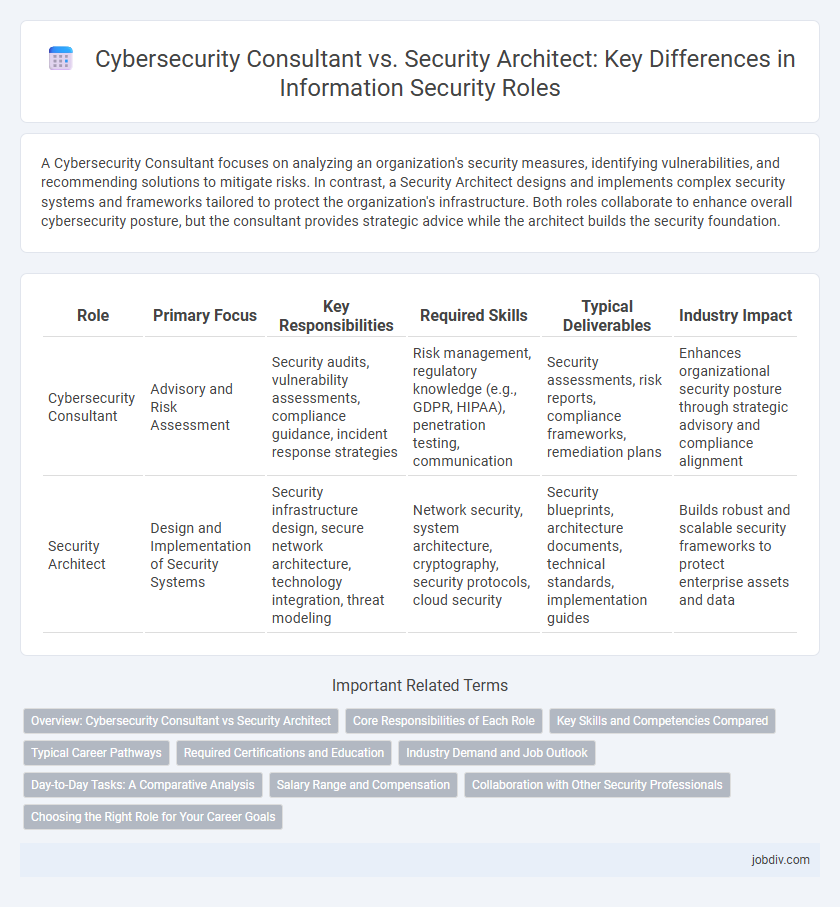A Cybersecurity Consultant focuses on analyzing an organization's security measures, identifying vulnerabilities, and recommending solutions to mitigate risks. In contrast, a Security Architect designs and implements complex security systems and frameworks tailored to protect the organization's infrastructure. Both roles collaborate to enhance overall cybersecurity posture, but the consultant provides strategic advice while the architect builds the security foundation.
Table of Comparison
| Role | Primary Focus | Key Responsibilities | Required Skills | Typical Deliverables | Industry Impact |
|---|---|---|---|---|---|
| Cybersecurity Consultant | Advisory and Risk Assessment | Security audits, vulnerability assessments, compliance guidance, incident response strategies | Risk management, regulatory knowledge (e.g., GDPR, HIPAA), penetration testing, communication | Security assessments, risk reports, compliance frameworks, remediation plans | Enhances organizational security posture through strategic advisory and compliance alignment |
| Security Architect | Design and Implementation of Security Systems | Security infrastructure design, secure network architecture, technology integration, threat modeling | Network security, system architecture, cryptography, security protocols, cloud security | Security blueprints, architecture documents, technical standards, implementation guides | Builds robust and scalable security frameworks to protect enterprise assets and data |
Overview: Cybersecurity Consultant vs Security Architect
Cybersecurity Consultants specialize in assessing vulnerabilities, advising on risk management strategies, and ensuring compliance with industry standards to protect organizational assets. Security Architects design and implement robust security frameworks, integrating advanced technologies and protocols to safeguard enterprise infrastructure against evolving threats. Both roles require deep expertise in cybersecurity principles, but Consultants focus more on strategic recommendations while Architects concentrate on technical system design and development.
Core Responsibilities of Each Role
Cybersecurity Consultants analyze security vulnerabilities, conduct risk assessments, and develop tailored security strategies to protect organizations from cyber threats. Security Architects design and implement robust security frameworks, establish system security standards, and ensure network infrastructure resilience against attacks. Both roles require deep expertise in threat modeling, but Consultants focus on advisory and compliance, while Architects prioritize strategic system design and integration.
Key Skills and Competencies Compared
Cybersecurity Consultants excel in risk assessment, threat analysis, and compliance frameworks, leveraging expertise in vulnerability management and incident response to protect organizational assets. Security Architects specialize in designing and implementing robust security infrastructure, emphasizing skills in network security, system integration, and secure software development. Both roles demand strong knowledge of encryption, identity management, and regulatory standards, but Consultants prioritize strategic advisory capabilities while Architects focus on technical design and architecture development.
Typical Career Pathways
Cybersecurity consultants often begin their careers with foundational experience in IT security, progressing through roles such as security analyst and penetration tester before specializing in consultancy to advise on risk management and compliance. Security architects typically start as network or systems administrators, advancing to security engineer positions where they design and implement secure infrastructures, eventually taking on responsibilities as architects to develop comprehensive security frameworks. Both career paths emphasize continuous learning in emerging threats, certifications like CISSP or CISM, and multidisciplinary expertise in compliance, risk assessment, and advanced security technologies.
Required Certifications and Education
Cybersecurity Consultants typically require certifications like CISSP, CISM, or CEH, complemented by a bachelor's degree in computer science or information security to demonstrate expertise in threat analysis and risk management. Security Architects usually hold advanced certifications such as CISSP-ISSAP, Certified Cloud Security Professional (CCSP), or SABSA, alongside a strong educational background in computer engineering or cybersecurity, reflecting their role in designing and implementing secure network infrastructures. Both roles value continuous education and hands-on experience to stay updated with evolving cyber threats and security technologies.
Industry Demand and Job Outlook
Cybersecurity Consultants and Security Architects both face increasing industry demand due to escalating cyber threats and regulatory compliance requirements. Job outlook projections from the Bureau of Labor Statistics indicate a 33% growth for information security analysts, with Security Architects often commanding higher salaries due to their specialized design and implementation roles. Industries such as finance, healthcare, and government show particularly strong demand, emphasizing cloud security and infrastructure protection skills.
Day-to-Day Tasks: A Comparative Analysis
Cybersecurity consultants focus on assessing vulnerabilities, conducting risk analyses, and advising organizations on security improvements through audits and compliance checks. Security architects design and implement secure network infrastructures, develop security policies, and oversee the integration of hardware and software to protect against cyber threats. While consultants provide strategic recommendations and incident response guidance, security architects ensure the continuous robustness of security systems through hands-on development and maintenance.
Salary Range and Compensation
Cybersecurity Consultants typically earn a salary range of $90,000 to $150,000 annually, with variations based on experience and location, while Security Architects command higher compensation, often between $120,000 and $180,000 per year due to their specialized expertise in designing security frameworks. Compensation packages for both roles may include bonuses, stock options, and benefits, with Security Architects generally receiving more substantial equity and performance-based incentives. Market demand and certifications such as CISSP or CISM also significantly influence salary levels for both positions in the cybersecurity field.
Collaboration with Other Security Professionals
Cybersecurity consultants collaborate closely with security architects to design and implement comprehensive security frameworks tailored to organizational needs. Security architects provide technical blueprints and strategic guidance, enabling consultants to assess risks and recommend practical solutions. Effective collaboration between these roles ensures a unified approach to threat detection, vulnerability management, and compliance adherence.
Choosing the Right Role for Your Career Goals
Cybersecurity consultants specialize in assessing risks and recommending tailored security solutions to protect organizational assets, while security architects design and build robust security infrastructures aligned with business objectives. Choosing the right role depends on your career goals: if you prefer hands-on risk analysis and client-facing advisory work, consultancy offers dynamic project variety; if you aim to shape long-term cybersecurity strategies through technical design and system integration, security architecture provides a deep focus on infrastructure development. Both roles require strong knowledge of threat landscapes, risk management frameworks, and compliance standards such as NIST, ISO 27001, and CIS Controls.
Cybersecurity Consultant vs Security Architect Infographic

 jobdiv.com
jobdiv.com